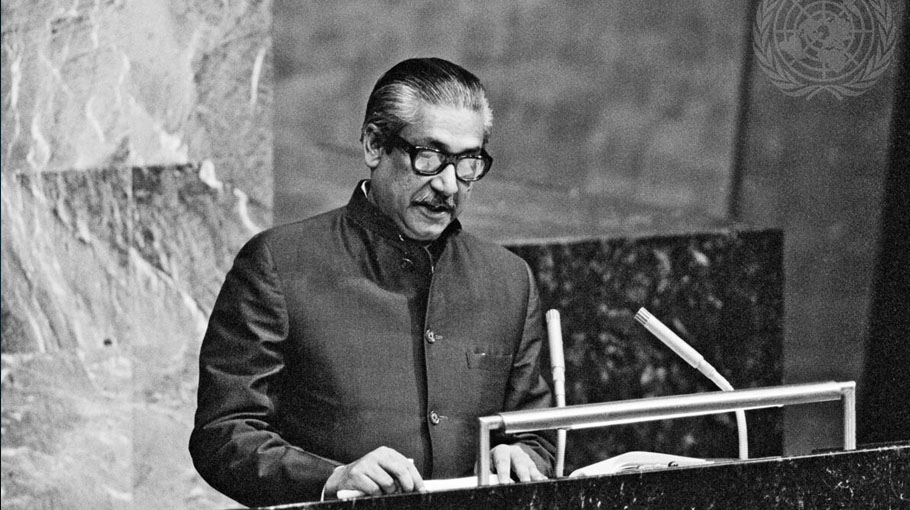Bangladesh enjoys fruits of Bangabandhu’s dev policies: Academics

Bangladesh is now enjoying the yields of development policies, plans and initiatives taken by Father of the Nation Bangabandhu in all sectors, including foreign policy, agriculture, education, health and technology, said academics.
“When Bangabandhu was assassinated in 1975, Bangladesh’s per capita income was highest in South Asia, higher than China and Malaysia, which proves how efficiently Bangabandhu took each plan and policy to take a war-ravaged country to that position within just three and a half years” noted academician Professor AAMS Arefin Siddique said.
Talking to BSS on the eve of Bangabandhu’s 103rd birth anniversary, Prof Arefin said it was very difficult to take per capita income to that level within the short span of time facing a number of challenges.
“Had Bangabandhu been alive and kept running the state that way, what would be the country’s position?” he said.
He said Bangabandhu had regarded poverty alleviation as his foremost task as he identified poverty as the key enemy in new-born war-ravaged Bangladesh.
“After the independence, Bangabandhu found poverty as the main enemy of the country. Bangabandhu believed poverty should be eradicated at first to reach the yields of independence to all,” he said.
He added: “Bangabandhu believed that peace should prevail in Bangladesh as well as the entire world for poverty alleviation. Without establishing peace in the entire world, poverty cannot be eradicated”.
Prof Arefin, also Dhaka University former vice-chancellor, said as Bangabandhu believed in culture of peace, he had introduced "Friendship to all, malice towards none" in his foreign policy.
Following this policy, Bangabandhu addressed the United Nations General Assembly (UNGA) on 25th September 1974 where he emphasized the need for establishing the World Peace and realizing human emancipation, he added.
In December 2022, Bangabandhu's historic quote - "Friendship to all, malice towards none" - was incorporated in the 14th paragraph of the UNGA resolution entitled "International Year of Dialogue as a Guarantee of Peace, 2023".
Writer and historian Professor Muntasir Mamoon said Bangabandhu had established the foundation of today’s Bangladesh as he formulated a huge number of laws and policies, the acts of all corporations and autonomous institutions, including the Dhaka University, during his three and a half years government tenure.
He said Bangabandhu also took initiatives over the oil, gas and power management, river, land boundary and water sharing issues.
“Bangabandhu wanted to build Bangladesh as an ideal state. To build an ideal state, he incorporated four basic principles-nationalism, democracy, secularism and socialism- of the state in the Constitution,” he said.
Mentioning that many countries don’t have such principles, the eminent academician said no other country had secularism and socialism in their state policy except the communist countries.
As Bangabandhu incorporated such principles in state policy in a third world country like Bangladesh, different capitalist countries, including America, and some Islamic countries hatched conspiracy to assassinate him, said Prof Muntasir Mamoon.
Because, these countries didn’t like the two things- socialism and secularism, he said.
“Bangabandhu gave new definitions of socialism and secularism. He said democratic socialism is not same to bureaucratic socialism. And secularism is that everyone will have equal rights to practise their respective religion and the state will not interfere there,” he said.
“Bangabandhu did one more thing and no other politician could dare to do so and that is imposing a ban on use of religion in politics and banned all religion-based political parties. No other statesman of any country could do so,” he said.
Professor Dr SM Shameem Reza of DU Mass communication and Journalism department said the foundation of development and progress Bangladesh achieved so far in all sectors including, education, agriculture, industry, social index and country’s contribution to global economy and peace building was laid during Bangabandhu government’s tenure.
“Formulating plans and implementing those are not everything required for a country’s development rather generating development thoughts considering its socio-economic context is a key requirement… Bangabandhu first came up with the thoughts for Bangladesh’s development after Liberation War”, he said.
Formulating constitution in a very short-span of time was one of Bangabandhu’s finest works because if a country doesn’t have a constitution it would create many crises in whole governance system due to lack of accountability and other things which ultimately would hamper the overall development process.
Within this short period, Bangabandhu formed a national education commission and then he started adopting national development and operational plan for each sector including agriculture and industry to make each sector vibrant and well connected to national plan.
Later, in the shortest time, Bangabandhu planned to rebuild the country’s administrative structure suitable for an independent country rearranging the old one. He also initiated to decentralize the administration which was a vital task for development, he added.
The most impressive development initiative of Bangabandhu was bringing the concept of public welfare oriented development plans which is still significantly relevant and one of the major requirements of Sustainable Development Goals (SDGs).
“Now, we are enjoying the yields of each development initiative Bangabandhu took for education sector, administration, national development, decentralizing administration as well as developing a great relation with international organisations and other developed countries”, said Reza.
“We cannot deny and forget the fact that our current development thoughts were commenced and inspired by Bangabandhu’s philosophy and initiative he took 50 years back”, he added.




